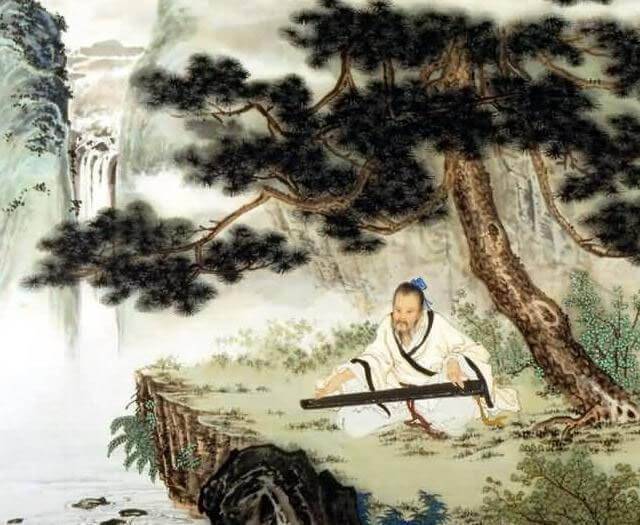On Hearing Dong Play the Flageolet a Poem to Palace-attendant Fang
- Poetry of Li Qi

蔡女昔造胡笳声,一弹一十有八拍。
胡人落泪沾边草,汉使断肠对归客。
古戍苍苍烽火寒,大荒沉沉飞雪白。
先拂商弦后角羽,四郊秋叶惊摵摵。
董夫子,通神明,深山窃听来妖精。
言迟更速皆应手,将往复旋如有情。
空山百鸟散还合,万里浮云阴且晴。
嘶酸雏雁失群夜,断绝胡儿恋母声。
川为净其波,鸟亦罢其鸣。
乌孙部落家乡远,逻娑沙尘哀怨生。
幽音变调忽飘洒,长风吹林雨堕瓦。
迸泉飒飒飞木末,野鹿呦呦走堂下。
长安城连东掖垣,凤凰池对青琐门。
高才脱略名与利,日夕望君抱琴至。
When this melody for the flageolet was made by Lady Cai,
When long ago one by one she sang its eighteen stanzas,
Even the Tartars were shedding tears into the border grasses,
And the envoy of China was heart-broken, turning back home with his escort.
...Cold fires now of old battles are grey on ancient forts,
And the wilderness is shadowed with white new-flying snow.
...When the player first brushes the Shang string and the Jue and then the Yu,
Autumn-leaves in all four quarters are shaken with a murmur.
Dong, the master,
Must have been taught in heaven.
Demons come from the deep pine-wood and stealthily listen
To music slow, then quick, following his hand,
Now far away, now near again, according to his heart.
A hundred birds from an empty mountain scatter and return;
Three thousand miles of floating clouds darken and lighten;
A wildgoose fledgling, left behind, cries for its flock,
And a Tartar child for the mother he loves.
Then river waves are calmed
And birds are mute that were singing,
And Wuzu tribes are homesick for their distant land,
And out of the dust of Siberian steppes rises a plaintive sorrow.
...Suddenly the low sound leaps to a freer tune,
Like a long wind swaying a forest, a downpour breaking tiles,
A cascade through the air, flying over tree-tops.
...A wild deer calls to his fellows. He is running among the mansions
In the corner of the capital by the Eastern Palace wall....
Phoenix Lake lies opposite the Gate of Green Jade;
But how can fame and profit concern a man of genius?
Day and night I long for him to bring his lute again.
Seven-character-ancient-verse
- Why Chinese poems is so special?
- The most distinctive features of Chinese poetry are: concision- many poems are only four lines, and few are much longer than eight; ambiguity- number, tense and parts of speech are often undetermined, creating particularly rich interpretative possibilities; and structure- most poems follow quite strict formal patterns which have beauty in themselves as well as highlighting meaningful contrasts.
- How to read a Chinese poem?
- Like an English poem, but more so. Everything is there for a reason, so try to find that reason. Think about all the possible connotations, and be aware of the different possibilities of number and tense. Look for contrasts: within lines, between the lines of each couplet and between successive couplets. Above all, don't worry about what the poet meant- find your meaning.
List of Chinese poets
Pre-Qin Poetry
Han poetry
Ban Gu Cao Cao Cao Zhi Cao Pi Cai Wenji Kong Rong Liu Bang Liu Che Qin Jia Ruan Ji Su Wu Wang Can Xiang Yu Xu Gan Zhang Heng AnonymousSix Dynasties Poetry
Tao Yuanming Zhang HuaTang poetry
Bai Juyi Bao Junhui Cen Shen Chen Zi'ang Cui Hao Chang Jian Cui Tu Chen Tao Du Fu Du Mu Du Shenyan Dai Shulun Du Xunhe Du Qiuniang Gao Shi Gu Kuang Gao Pian Han Yu He Zhizhang Han Hong Huangfu Ran Han Wo Huang Chao Jia Dao Jiaoran Jin Changzu Li Bai (Li Po) Li He Li Shangyin Liu Yuxi Liu Zongyuan Luo Binwang Li Qi Liu Changqing Lu Lun Li Shen Li Yu Li Qiao Li Yi Liu Fangping Liu Zhongyong Li Ye Meng Haoran Meng Jiao Ma Dai Pei Di Qian Qi Quan Deyu Sikong Shu Song Zhiwen Shen Quanqi Shangguan Wan'er Xuanzong of Tang Wang Bo Wang Changling Wang Wei Wang Zhihuan Wei Yingwu Wen Tingyun Wang Han Wei Zhuang Wang Wan Xue Tao Xu Hun Xu Hui Yuan Zhen Yu Xuanji Yu Shinan Yuan Jie Zhang Jiuling Zhang Ji Zhang Hu Zhang Zhihe Zu Yong Zhang Xu Zhu Qingyu Zheng Tian Zhang Bi Zhang RuoxuSong Poetry
Cai Xiang Chao Chongzhi Fan Chengda Fan Zhongyan Huang Tingjian He Zhu Kou Zhun Jiang Kui Lu You Li Qingzhao Liu Yong Mei Yaochen Ouyang Xiu Pan Lang Qin Guan Qian Weiyan Su Shi Su Zhe Song Qi Wang Anshi Wen Tianxiang Weng Juan Xin Qiji Yang Wanli Yue Fei Yan Jidao Yan Shu Ye Shaoweng Zeng Gong Zhang Xian Zhou Bangyan Zhu Shuzhen Zhu Xi Zhou DunyiYuan poetry
Bai Pu Guan Hanqing Ma Zhiyuan Xu Zaisi Yang WeizhenMing poetry
Chen Jiru Tang Yin Tang Xianzu Xu Wei Yu Qian Yang ShenQing poetry
Cao Xueqin He Shuangqing Nalan Xingde Pu Songling Tsangyang Gyatso Wang Guowei Yuan Mei Zheng Xie Zhao Yi